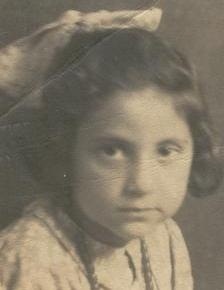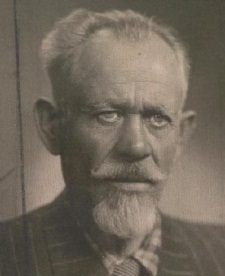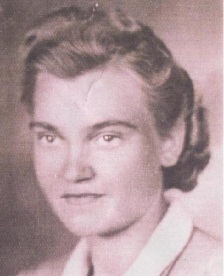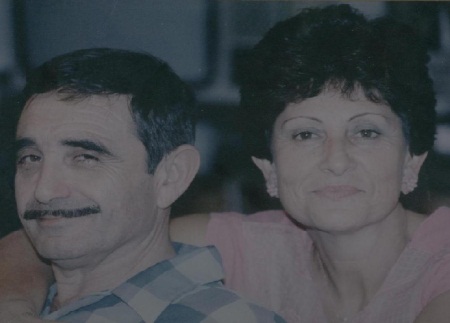Survival in the bunker
By Naomi Kornberg (Zoshe orlander)
I was born in April 1939, in the town of Zolkiew, near the regional city of Lvov. My brother Zigush and I were the only young children in the family. My mother, Rachel, was the youngest of six children in the Reitzfeld family.
My family was well off, the owners of a factory for the production of oil and well known in the town. The relationships among the families of the various children were warm and loving. On 23 September 1939, following the signing of the Ribbentrop – Molotov agreement, the town was placed under Russian control and as a result of this all property owners were sent to prison (the prison building was later burnt down, with the prisoners still in it) or exiled to Kazakhstan. Some members of my extended family, my grandmother Leah and her oldest daughter Rozha, her husband and their children, together with her son Manek (the fourth of the six children). The other children – Salka, Nicha, Yosek and Uchka remained in the town, together with their families.
When Zolkiew was retaken by the Germans on 28 June 1941 our world collapsed entirely. The Zolkiew ghetto was created in December 1942 and all of the remaining Jews, we among them, were forced to enter it. Thus, the nightmare was doubled and tripled. People died of hunger, of typhus and of Nazi oppression. On 25 March 1943 the Germans began to destroy the ghetto. Our parents were murdered and we, my brother Zigush who was older than me by four years and I, remained alone in the attic. To our luck, a relative appeared who was aware of our existence and smuggled us out of the ghetto. He told my brother and me to go to a hiding place under the house of someone we knew, and said: “Tell the man who opens the door that you know that aunt Salka and her family are in the hiding place and that you beg to be hidden there too”. And so it was that we walked on a Sunday morning, two Jewish children, along the main street, up to the front door. We knocked, the door opened, and the man of the house, Valenti Beck, stood in the doorway, astonished, and asked “Children, what are you doing here?” Zigush, eight years old, repeated the request we had been coached to make, to find a hiding place. “I can’t,” said Mr. Beck. My brother looked at him and answered “I’m grown up already, I’ll run to the forest to join the partisans, but my sister is little. Please, hide just her”.
Well, a miracle took place and Mr. Beck agreed to hide both of us in the bunker, together with the 16 other people who were already hiding there, two of whom were other children – Igo, 10, and Carolina, 8. Mr. Beck, who was a devout Catholic, believed that my brother and I were lucky children and that God wanted us to live, so that it was his mission to save us. They took us down into the bunker, where it was dark, chokingly stuffy and hot. To ventilate the place they would remove a brick from the wall that faced the garden in the back. In the winter it was bitterly cold and in the summer beastly hot. They explained to me, an eight year old girl, “That they didn’t dare to speak loudly. We were forbidden to cry or to cough and that if we absolutely had to do so, we should do it into a pillow so that we wouldn’t be heard, god forbid, from the outside.”One day, Mr. Beck’s sister-in-law came running to report that one of the neighbors had informed the Germans that Mr. Beck was hiding Jews, and that the Germans were on their way to search his house. Mr. Beck knocked on the bunker door to warn us to sit still, without moving or making a sound, and a few minutes later there was loud banging on the front door of the house. Ella, Mr. and Mrs. Beck’s pretty young daughter, opened the door and said in a tone of innocence and surprise “What’s happened?” One of the three Germans answered “We were told that you are hiding Jews”. Ella answered with a giggle, “Jews here? Maybe I look Jewish to you? Take me”.
Apparently, the three young Germans were a bit embarrassed, but they carried out the search all the same and a few minutes later left the house. To our regret, one of the three, Hans, fell in love with the pretty Ella and continued to visit her regularly. The very same German, who was a sadist and an exemplary Nazi, boasted every time he called of his success in finding Jews in hiding places and clearing them out, to be killed. And we sat down there, listening and trembling with anxiety and pain. We had been in the bunker about a week when a horrible fire broke out on the street. We, who were unaware of the fire, opened the vent hole and instead of fresh air thick black smoke blew into the bunker. We began to choke. We started to panic, not knowing what to do. To leave the bunker was out of the question, the house was surrounded by lots of people, including Germans and Ukrainians. The men in the bunker went up to pour water on the house walls. My young cousin, Mania, snuck out of the house before her father was able to stop her. Two days later, Mr. Beck told us that Mania had met two young Ukrainians who had been her classmates and that they had turned her over to the Gestapo in exchange for a bottle of vodka and a kilo of flour, and thus her life was cut off at the age of 15.
Once again, a miracle took place and the fire was stopped at the door of our house so that we were saved once again. Mr. Beck, his wife Julia and their daughter Ella took care of our basic needs as much as they were able to. Hour by hour, minute by minute they put their lives in danger for us. They were heroic beyond description, even when the Germans searched for Jews in their home after they were informed on time and again. Mr. Beck befriended members of the local police force and often invited them to his home to drink and play cards. All of this he did in order to allay suspicion. Julia and Alla bought, carried and cooked food for 18 people. They had to maneuver among impossible dangers, as when German railway workers came to the house and when Germans came looking for Ella – so that it was necessary to be endlessly careful with them as well. Down below, we lived in perpetual fear and terror. Hunger ate at us without a break and the rats ran around everywhere. When our family ran out of money we had to sell our clothes so that Mr. Beck could get money for them on the black market to buy what little food he could.
Yom Kippur came around in 1943. All of the adults fasted, in spite of the awful conditions in the bunker. As Yom Kippur drew to a close the family sat down to a meal and only we had nothing with which to break the fast. Suddenly, a knock was heard. We opened the door and the bunker was filled with the smell of delicatessen and chicken soup. Following the aroma came the head of Julia, who was carrying a large pot. She called us and said “I know that you have fasted and that you have nothing with which to ease your hunger. I couldn’t bear the thought that you should remain hungry and I can’t eat when you are so hungry. Take this and enjoy it”. That’s what Julia was like: a devout Catholic with a big heart. Mr. Beck also used to come down into the bunker at times of despair and fear, to give us courage. He believed with all his heart that Jesus would not agree with what the Nazis were doing and that he was given the task of saving us. In this way we survived in the bunker, until we were freed on 23 July 1944, when the Red Army captured the town and freed us.
After the war we wandered for another five years among the displaced persons camps throughout Europe. My brother was also able to get onto the “Exodus” and to return aboard her to Hamburg, Germany. We were later reunited and came to Israel in the summer of 1949. We rebuilt our lives, raised families and played active roles in building the country, for which we are both proud and thankful.



